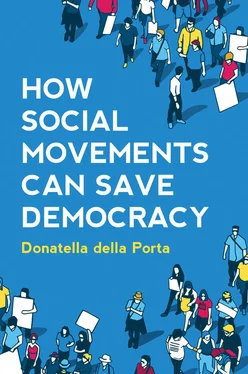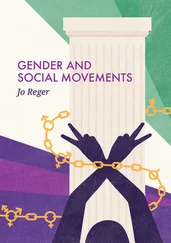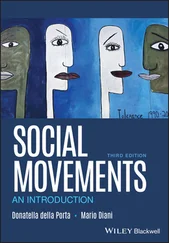In addressing this task, I rely on a long-lasting research programme on institutional involvement by progressive social movements, carried out at the Center on Social Movement Studies (Cosmos) that I direct at the Scuola Normale Superiore in Florence. In particular, on crowd-sourced constitutionalism, referendums from below and movement parties, I have collaborated especially with my colleagues at Cosmos Lorenzo Cini, Andrea Felicetti, Francis O’Connor, Martin Portos, Anna Subirats, Hara Kouki, Lorenzo Mosca, Joseba Fernandez, Daniela Chironi and Jonas Draege, as well as with Colin Crouch, Michael Keating, Ken Roberts and Sidney Tarrow, who have been our most welcome visitors. I am also grateful for the support I received from the Hertie School of Governance and for the conversations I had during some visits to Berlin with colleagues there, among them Helmut Anheier, Christian Joerges and Claus Offe. At Hertie, I also wish to thank Stefanie Jost, who helped me in developing the project for this book. Some important stimuli also came from presentation of parts of my work at seminars and conferences, in particular at the Stein Rokkan Lecture at the Joint Sessions of the European Consortium for Political Research in Mons in 2019. Herbert Reiter has helped me greatly, improving the text through his critical but constructive reading (as well as through his patience and support while I was writing this book).
1 Democratic Innovations and Social Movements
The Great Recession that hit the world in 2008 worked as a critical juncture, nurturing socioeconomic but also political transformations. Some of the political developments during the crisis have challenged civil, political and social rights, triggering a Great Regression (Geiselberger 2017). Increasing social inequalities have spiralled, with growing mistrust in established institutions fuelling a sense of insecurity and xenophobic reaction (Streeck 2017; Bauman 2017a). While scholars are debating how much inequality democracy can withstand without breaking down (della Porta, Keating et al. 2018), resistance to the backlash is also developing, with citizens mobilizing for social justice and ‘real democracy’ (Meyer and Tarrow 2018).
This volume will focus on some innovative proposals, emerging from progressive social movements, that aim at increasing participation and deliberation in order to save democracy. Exploiting windows of opportunity offered by institutions of direct democracy, social movements have promoted referendums or infiltrated ‘from below’ referendums promoted by other actors in a more top-down fashion (della Porta, O’Connor et al. 2017a). Party systems have been dramatically shaken, with the breakdown of mainstream parties and, in some cases, an unexpected rise of movement parties on the left (della Porta, Fernández et al. 2017a), as well as right-wing populist ones. Similarly unexpected success has come to candidates that appeal to social justice and citizens’ participation within old-Left parties, among them Labour in the United Kingdom and the Democratic Party in the United States. In addressing these developments, I suggest that times of crisis are times of rapid change, presenting challenges to existing institutions but also, potentially, opening opportunities for a deepening of democracy.
This chapter will introduce the theoretical discussion on the potential innovative contributions by civic society that have indeed been addressed in democratic theory, as well as in various approaches within social movement studies. While movements have been studied mainly as contentious actors, fighting in the streets to resist or promote political change, social movement studies have also pointed at their capacity to nurture innovative ideas, as movements are constantly engaged in generating and spreading counter-expertise and new forms of knowledge. In doing so, social movements are endowed with specific ontological, epistemological and methodological preferences. This chapter therefore addresses the channels through which social movements’ ideas enter institutions, singling out conditions that favour (or thwart) the development of innovative ideas and plural knowledge. It suggests that, by providing for alternative knowledge, progressive movements might contribute to the deepening of democracy through increasing the plurality of ideas.
Democratic challenges in the Great Recession
In the countries that have been most hit by the financial crisis, particularly in the European periphery, waves of protest have challenged the austerity policies adopted by national governments under heavy pressure from international institutions including the European Union (EU), the European Central Bank (ECB) and the International Monetary Fund (IMF). These protest waves – known as Indignados or Occupy movements – reflected but also strengthened a legitimacy crisis, caused by what protesters saw as a lack of concern by political institutions for the suffering of their citizens (della Porta 2015b). Protests took different forms in different countries, influenced by the different timing and characteristics of the financial crisis, as well as by the domestic opportunities and threats facing social movements (della Porta, Andretta et al. 2016).
The Great Recession had immediate and often dramatic political effects on what Robert Dahl (2000) dubbed ‘really existing’ democracies, especially on representative institutions. The crisis of institutional trust fuelled calls for constitutional reforms that could help refound the political community. Really existing democracies have certainly been under stress, but there is also potential for innovation. The multiple (financial, social, political) crises have in particular increased the tensions between those scholars and politicians who have considered citizens as too emotional and ignorant to make sensible choices, stressing the need for technical expertise, and those who have instead blamed an ‘econocracy’ that has taken over political decisions while pretending they are not political (Earle et al. 2017), as well as the idea of an ‘epistocracy’ in which only the most knowledgeable people can vote (Brennan 2016). Siding with a participatory and deliberative vision, I will suggest that what we need is more, rather than less, citizen participation in democracy, and look at some democratic innovations that could contribute to it.
The challenges to representative democracies during the Great Recession bring about a need to reflect on democratic qualities. Democracy has in fact a contested meaning, with different qualities stressed in different understandings of the concept of democracy itself and the evaluation of democratic practices. A concept with a long history, democracy ‘has meant different things to different people at different times and places’ (Dahl 2000, 3). In time, a minimalist definition of democracy as electoral accountability has emerged, and democracy has been identified with the current characteristics of Western polities (Held 2006, 166).
The widespread democratic malaise has, however, challenged the identification of the meaning of democracy with its minimalistic vision or currently existing institutions. While electoral accountability has been considered as the main democratic mechanism in the historical evolution of the discourse on really existing democracy, today’s challenges to representative democracy focus attention on other democratic qualities (Rosanvallon 2006). The mainstream conceptions and practices of democracy are in particular contested in the name of other conceptions and practices, which political theorists have addressed under labels such as participatory democracy, strong democracy, discursive democracy, communicative democracy, welfare democracy or associative democracy (see della Porta 2013, ch. 1).
Читать дальше












